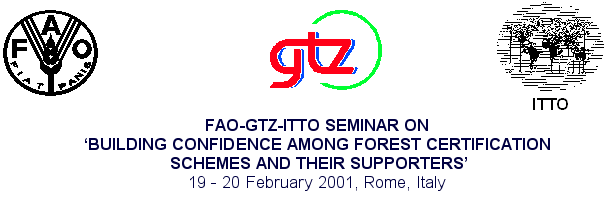



Estudios Rurales y Asesorķa
Campesina
Francisco Chapela
Rome, 18 February 2001
Summary
This presentation builds primarily on author's experience on community forestry and certification in Mexico. Outlines the importance that community forestry has gained in Mexico and suggests that this strategy can promote sustainable forest management at least in high-density, high-biodiversity areas in the world. Finally, it concludes that certification systems needs to adequately address community forestry to be credible. In particular, should: (1) Adequately address territory, management systems and equity issues; (2) become simple enough to be transparent and replicable in a multi-cultural context; (3) be economically non-discriminatory and become affordable for communities with relatively small FMU; (4) be independent from both FMU co-coordinators and from government officers; (5) avoid discriminatory practices, such as have only certifiers from the "north", or only bureaucrats deciding certification standards and procedures.
Community Forestry in Mexico
Community forestry includes a range of situations where a group of people, indigenous or non-indigenous collectively manages a forest area. Is different from forestry in private lands, because management decisions and benefits are shared by a community. It is also different from forestry in public lands, because although collective, decisions and benefits concern primarily to the community. In Mexico, community forestry has gained high importance:
· 80% of forests in Mexico are legally owned by indigenous or peasant communities. 60% of round wood supply comes from management units ran by these communities.
· About 8 million people inhabit in the forest areas, and depend on forests to live.
· Population densities are above the world average. Human pressure is high.
· Although most of the forests in Mexico are secondary, the country hosts about 10% of all the species in the planet.
· Mexico's biological diversity can be explained in part AS A CONSEQUENCE of traditional management systems
Potential for Community Forestry in the world
Although country-specific, the case of Mexico shows the opportunity to manage wider areas in the world, specially in those areas where relatively high population densities coincide with high levels of biodiversity, such as the Mediterranean, Mesoamerican or the Andean areas.
· The coincidence between high-diversity hot spots and high population densities in the world, suggests that community forestry may be an effective approach to maintain forest values through sustainable use, at least in those places in the world sharing high biological diversity and high population densities.
· Perhaps a different approach would be needed in the low-populated "wilderness areas" such as the Congo or Amazon basins.
Community Forestry: fostering an stewardship relationship
Community forestry enables positive relationships where both people depend directly on the forest and local communities nourish forests. In a community forestry context:
· People lives from the land
· People cannot take risks; therefore landscape and species diversity is promoted
· Forests are maintained and shaped by human activities.
Key components of sustainable community forestry systems
From a community forestry perspective, any certification system needs to adequately address the basic issues that make the difference between sustainable and unsustainable management system. A certification approach that does not take these issues properly into account is very difficult to be credible. Among the components of sustainable community forestry systems, at least three seem to be key to keep these systems functioning:
Territories
Without territories, community stewardship is not feasible. Therefore, a credible certification system should:
· Consider community land as the basic forest management unit. Broad national-level approaches are not enough.
· Consider the extent indigenous or communal territories are being recognized and secured. Check ILO conventions are observed when applicable.
· Check that communal decision mechanisms are in place.
Management system
(Tropical) Forests are complex systems. Therefore, adaptive management approaches are needed, rather than deterministic ones. To be credible, a certification system should:
· Consider the extent indigenous or local communities are taking the basic management decisions. Not just consulted.
· Check that an appropriate monitoring and evaluation system is set up, so corrective decisions can be taken as needed.
· Verify that the monitoring and evaluation system consider both economic and environmental performance.
Equity
Without clear and concrete benefits, there is no incentive for community stewardship. Therefore, a credible certification system should:
· Evaluate how long the management system uses the main production opportunities.
· Check that community members have basically equal opportunities to benefit from the management system.
· Check that there are mechanisms for social investment, such as education or health care programs.
Institutional issues
In social terms, all international certification systems (i.e. PEFC, FSC, Montreal Process, ITTO) face one or several challenges to be credible. Among others, these challenges include:
· Adequately address the territory, management system and equity issues.
· Become simple enough to be transparent and replicable in a multi-cultural context; i.e. local and external evaluations should be similar.
· Be economically non-discriminatory and become affordable for communities with relatively small FMU.
· Be independent from both FMU co-coordinators and from government officers.
Avoid discriminatory practices, such as have only certifiers from the "north", or only bureaucrats deciding certification standards and procedures.